Search the Special Collections and Archives Portal
Search Results

Transcript of interview with Renee Diamond by Barbara Tabach, November 20, 2014
Date
Archival Collection
Description
In this interview, Renee Diamond discusses coming to Las Vegas via Los Angeles, with her husband and children in the 1970s and getting involved in politics. She talks about her husband, Leo, and his business selling vinyl records in L.A., and her work in a doctor's office. Once in Las Vegas, the Diamonds joined Temple Beth Sholom and later Congregation Ner Tamid. Renee talks about her involvement in the political arena in southern Nevada, including the League of Women Voters.
Community activism and social justice rank high in the legacy of Renee Diamond. She often refers to herself as one of the last of the generation without college degrees that could make a difference in the politics of the state. When Renee, her husband Leo Diamond moved their family to Las Vegas from southern California, the energetic advocate Renee quickly plugged into the community. The word "No" was not part of her vocabulary. Among the many Jewish and secular activities the she engaged in were: the editorial board of the Jewish Reporter newspaper; Hadassah; Anti-Defamation League; Red Cross Board; State Museum Board to name a few. She remains a vibrant Democratic Party leader and served one term on the Nevada Assembly in 1989. She was on the front lines as a fierce and active supporter of Welfare Rights, Fair Housing and the Equal Rights Amendment. It is a life that included working alongside illustrious women and men of Southern Nevada history. A list that includes: Harriet Trudell, Ruby Duncan, Myrna Williams and Dorothy Eisenberg and many more mentioned here. Meanwhile she raised four children and enjoyed a loving 43-year marriage with Leo (aka "Uncle Leo") whose career included the popular Bingo Palace, Slots-A-Fun and Stations Casinos. During this oral history interview she recalls the Las Vegas that she moved to in 1972 and reflects on what attracted people here, ways to be part of the Jewish life which might even include a bowling league and how involvement in raising social awareness was a worthy investment of ones' time. This is a look at a woman who made a difference.
Text
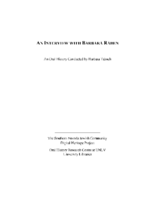
Transcript of interview with Barbara Raben by Barbara Tabach, February 24, 2015
Date
Archival Collection
Description
Interview with Barbara Raben by Barbara Tabach on February 24, 2015. In the first part of the interview Raben discusses her involvement with Hadassah in Southern Nevada, and the various groups within that organization. During the second part of the interview, she talks about her family and her relationship to Judaism, and moving to Las Vegas in 1991. Raben discusses the business she built in Los Angeles and Las Vegas called the Candy Factory. She then talks about the formation of Midbar Kodesh with other families from Temple Beth Sholom. Raben continues to be involved in the Jewish community and the Jewish Family Service Agency.
In 1945, Barbara Raben was born to Kermit and Adele Shulman, children of Eastern European emigrants. She enjoyed a happy childhood in Stamford, Connecticut, and was raised with a strong Jewish identity. After attending college in New Jersey, Barbara married Richard Grisar, and the couple lived in London for a year, before returning to Stamford. In 1975, Barbara and Richard moved to Los Angeles where Barbara owned and operated a very successful candy business, Candy Factory. Sixteen years later, Barbara sold her business, and the family relocated permanently to Las Vegas, where her husband owned radio stations. Barbara has always been an active member of the Jewish community, wherever she lived, giving her time to synagogue, children's day school and service organizations. Upon arriving in Las Vegas, Barbara and her family were members of Temple Beth Sholom, before leaving the congregation to start Midbar Kodesh Temple with a small group of other families. She has been an active member of Hadassah Southern Nevada Chapter for over a decade, helping rebuild the organization locally after participating in the Hadassah Leadership Academy, a program designed to engage a younger generation of members. Currently, Barbara serves as board president and interim executive director for Jewish Family Service. In 2004, then a widow, she married Terry Raben. Barbara has four sons with her first husband: Michael, Andrew, David and Marc Grisar.
Text
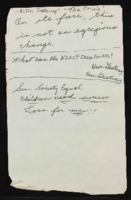
Las Vegas branch NAACP records: documents, correspondence
Date
Archival Collection
Description
Folder of materials from the Mabel Hoggard Papers (MS-00565) -- Civic engagement file. National Association for the Advancement of Colored People (NAACP) certificate, journal, radio script, program booklets, and correspondence. This folder includes a policy statement of the NAACP, certificate of merit, education department features booklet, Gala Celebration and Awards Banquet booklets, and NAACP Historical Committee documents.
Mixed Content
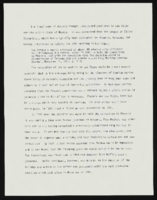
Untitled, Martin Luther King holiday: manuscript draft by Roosevelt Fitzgerald
Date
Archival Collection
Description
From the Roosevelt Fitzgerald Professional Papers (MS-01082) -- Unpublished manuscripts file.
Text
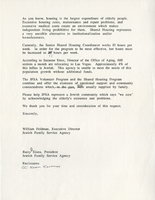
Letters from the Jewish Family Service Agency requesting financial aid from the Jewish Federation Foundation, February 1989
Date
Archival Collection
Description
Rough-draft versions of letters written by William Feldman, Executive Director of the Jewish Family Service Agency (JFSA), and Barry D. Eisen, President of the Jewish Family Service Agency, to Norman Kaufman, Executive Director of the Jewish Federation, and Paul Eisenberg, Chairman of the Endowment Committee, requesting financial aid from the Jewish Federation Foundation endowment fund to support the Jewish Family Service Agency's Elderly Services program. (Original order of pages is unclear, some pages may have been lost prior to donation.)
Text
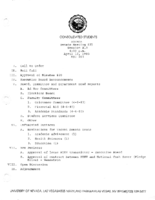
Meeting minutes for Consolidated Student Senate, University of Nevada, Las Vegas, April 12, 1983
Date
Archival Collection
Description
Text

Transcript of interview with Roger Thomas by Stefani Evans and Claytee D. White, August 31, 2016
Date
Archival Collection
Description
As he reveals in this oral history, Roger Thomas is, among many other things, a son, a father, a brother, a husband, a student, an artist, a visionary, and a philanthropist. As the second son of Peggy and E. Parry Thomas’s five children, Roger was raised a Mormon child of privilege and civic responsibility. The banking family summered in Newport Beach, wintered in Sun Valley, and taught their children by words and deeds that it is not up for debate if you will be involved in your community; the only question is how you will apply your talents and resources to benefit your community. Roger absorbed the lessons well. As a child who struggled in school but excelled in art, he attended his last two years of high school at Interlochen Arts Academy, graduating in 1969, finally finding himself “in an environment where what I did had currency.” From there he earned his BFA from the School of the Museum of Fine Arts Boston and Studio Degree from Tufts University before returning to Las Vegas and eventually joining Steve Wynn’s team in 1981. As Executive Vice President of Design for Wynn Design & Development, he is the man in whom Steve Wynn places his trust to make real at each Wynn property the Wynn design philosophy: aim for a constituency of highly sophisticated, well-traveled, very educated people and give them a reality, a now, that is so fetching, so alluring they wish to be no place else. As he was mentored by his father and Steve Wynn, he too is mentoring those who will follow him. At Wynn, the next generation will carry forward the Wynn idea of evoca-texture, of creating “moments of experiential emotion that result in a memory so captivating and so unique that if you want to repeat that you have to come back.” At home, he collaborates with his daughter on a children’s book that has the potential to become a series; she is the illustrator, while he provides the words. Roger Thomas sat for this interview five days after his father, E. Parry Thomas, passed away in Idaho. Instead of postponing the interview to a more convenient time, Roger kept the appointment and explained, “This is for UNLV. If I’d cancelled my father would have killed me.”
Text

Gregory T. H. Lee oral history interview: transcript
Date
Archival Collection
Description
Oral history interview with Gregory T. H. Lee conducted by Stefani Evans, Ayrton Yamaguchi, Cecilia Winchell, and Kristel Marie Peralta on December 1, 2020 for Reflections: The Las Vegas Asian American and Pacific Islander Oral History Project. Gregory discusses his birth in Honolulu, Hawai'i, his upbringing in San Francisco, California, his education from Harvard University, and his moving to Las Vegas in 1988 with his family. He shares how his parents, Doris Shoong Lee and Ted Lee, purchased a casino on East Sahara Avenue and renamed it the Eureka before Gregory left Las Vegas to earn his Juris Doctorate degree from USC Gould School of Law. He talks about his employment history related to law and the joint venture with his parents to open Eureka's sister property in Mesquite, Nevada. Gregory also discusses his Chinese and Japanese heritage, the Hawaiian culture, and his current affairs as well as his take on current events and discrimination in the United States, with particular regard to Black Lives Matter and COVID-19. Subjects discussed include: Kyushu, Japan and "China virus."
Text

Nancy Brune oral history interview: transcript
Date
Archival Collection
Description
Oral history interview with Nancy Brune conducted by Monserrath Hernandez and Rodrigo Vazquez on August 21, 2019 for the Latinx Voices of Southern Nevada Oral History Project. In this interview, Brune recalls her childhood and her experiences growing up in Austin and San Antonio, Texas to a Mexican-American father and British mother. She often identifies herself as tejana. Brune has lived in Las Vegas, Nevada since 2007 and is the Executive Director of the Kenny Guinn Center for Policy Priorities. Brune is a graduate of Harvard and has a doctoral degree from Yale University. She and her husband, Richard Boulware, who is a born and raised Las Vegan, have three children.
Text

